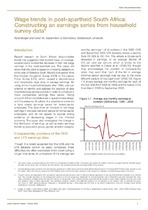| dc.contributor.author | Yu, Derek | |
| dc.contributor.author | Burger, Rulof | |
| dc.date.accessioned | 2021-03-05T09:26:21Z | |
| dc.date.available | 2021-03-05T09:26:21Z | |
| dc.date.issued | 2006 | |
| dc.identifier.citation | Yu, D., & Burger, R. (2006). Wage trends in post-apartheid South Africa: Constructing an earnings series from household survey data. Labour Market Frontiers, Stellenbosch University | en_US |
| dc.identifier.uri | https://ideas.repec.org/p/ctw/wpaper/07117.html | |
| dc.identifier.uri | http://hdl.handle.net/10566/5962 | |
| dc.description.abstract | Recent research on South African labour-market
trends has suggested that workers have, on average,
experienced a substantial decrease in their real wage
earnings in the post-apartheid era. This paper will
show that this claim is based on choosing datasets on
either side of Statistics South Africa’s changeover from
the October Household Survey (OHS) to the Labour
Force Survey (LFS), which caused a discontinuous
and inexplicably large drop in average earnings. By
using all the household datasets after 1994, one can
attempt to identify and address the sources of data
inconsistencies across surveys in order to construct a
more comparable earnings time series. Taking
account of the inconsistencies in questionnaire design
and the presence of outliers, it is possible to construct
a fairly stable earnings series for formal-sector
employees. | en_US |
| dc.language.iso | en | en_US |
| dc.publisher | South African Reserve Bank | en_US |
| dc.subject | South Africa | en_US |
| dc.subject | Earnings | en_US |
| dc.subject | Wages | en_US |
| dc.subject | Labour market trends | en_US |
| dc.title | Wage trends in post-apartheid South Africa: Constructing an earnings series from household survey data | en_US |
| dc.type | Article | en_US |

